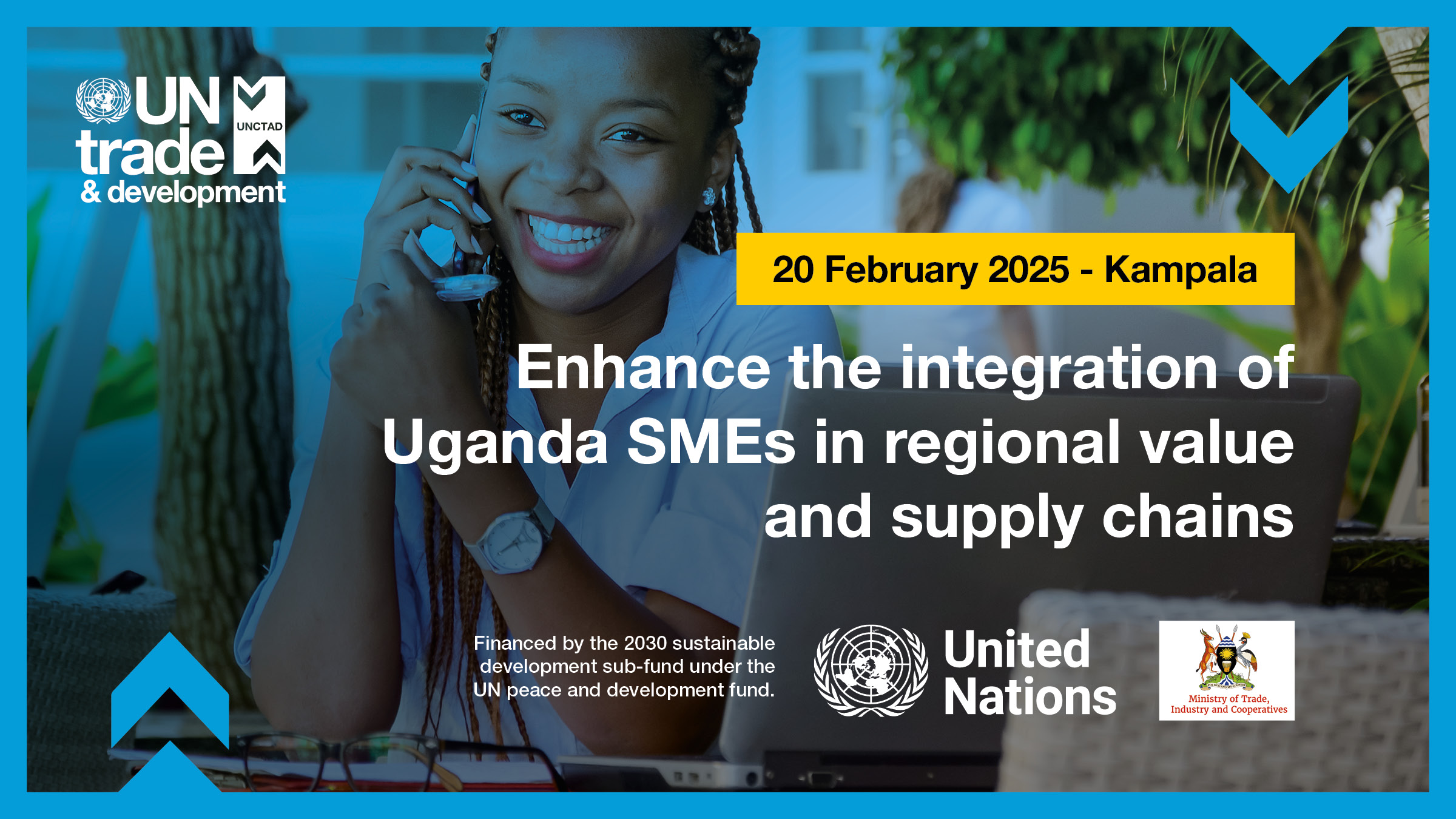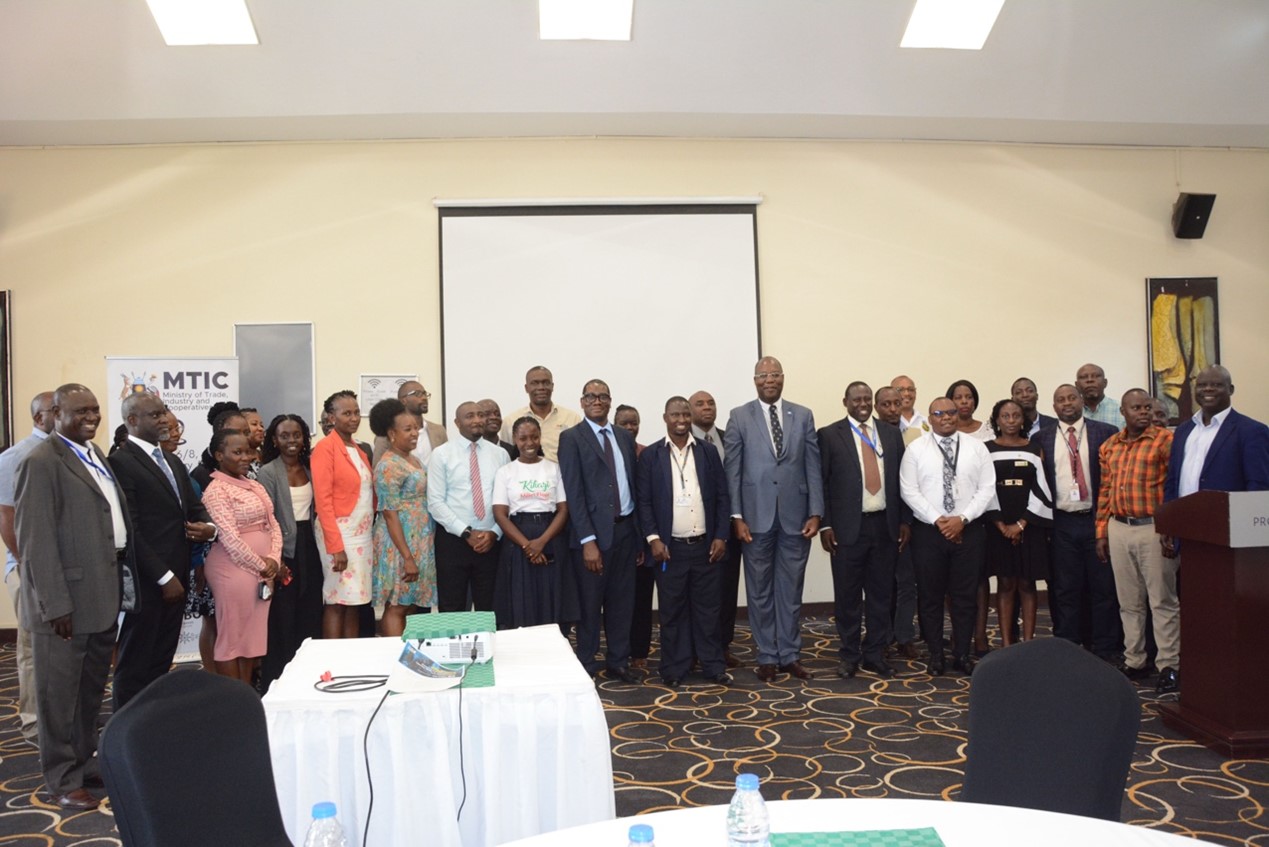On 20 February 2025, UNCTAD officially launched its project on “Enhancing Ugandan Small and Medium-sized Enterprises’ (SMEs’) Participation in Regional Value Chains” during a national consultation workshop held in Kampala. Organized jointly with the Ministry of Trade, Industry, and Cooperatives (MTIC) and in collaboration with the UN Resident Coordinator’s Office (UN RCO), the workshop brought together more than 30 stakeholders from the government, private sector, development partners and academia to discuss the project's implementation in Uganda and alignment with national priorities.
In his opening remarks, Hon. Francis Mwebesa, Minister of Trade, Industry, and Cooperatives, emphasized the critical role of SMEs in the economy, noting that they operate in sectors that are crucial for achieving the country’s Vision 2040 and promoting inclusive development. He highlighted the government’s commitment to supporting SME growth through reforms and policy interventions.
One component of the project in Uganda is an impact study on the opportunities and challenges of the Ugandan SMEs’ participation in regional value chains, whose preliminary findings were presented during the workshop. The study focuses on six key sectors with high-value opportunities for SMEs to increase value addition and expand exports under the African Continental Free Trade Area (AfCFTA). These sectors are iron and steel, the automotive industry, coffee, dairy products, fish and fish products, and pharmaceuticals. Among these, the automotive and iron & steel sectors are examined in greater detail, as they align well with the country’s industrialisation goals and have strong links to other sectors. The study explores opportunities for expanding into new markets and introducing new products by analysing demand, competition and Uganda’s comparative advantages. It also outlines strategies for SMEs and provides policy recommendations on how to leverage these opportunities.
Workshop participants highlighted several key challenges hindering SME participation in regional trade. These included limited market access due to non-tariff barriers, the high cost of credit, weak financial literacy, inadequate trade infrastructure, the lack of digital tools to facilitate cross-border trade, limited market intelligence, and compliance and certification barriers. These challenges will be considered in the study to ensure that the recommendations are more targeted. Additionally, the need for industrial parks, export-free zones and improved transport infrastructure was emphasized as essential for Uganda’s SMEs to expand their reach beyond domestic and East African Community (EAC) markets.
Another key highlight of the workshop was UNCTAD’s introduction of its Trade Mobile Application, a digital tool designed to collect real-time data on Informal Cross-Border Trade (ICBT) and improve SME access to market information. Uganda will be one of the pilot countries to test this innovative solution that aims to provide businesses and policymakers with accurate trade data.
Looking ahead, the project will proceed with the finalization of the ongoing impact study, which will provide a comprehensive assessment of the opportunities and challenges for Ugandan SMEs in regional trade. A validation workshop will be organized to present the study’s key findings and discuss the next steps in implementation.
Participants from the government, private sector, development partners and academia during the national consultation workshop on enhancing SMEs’ integration into regional value chains, held in Kampala on 20 February 2025.
Uganda has experienced steady economic growth, yet its trade structure remains highly dependent on a limited number of commodities, which hinders economic diversification.
While regional trade within frameworks like the East African Community, the Common Market for Eastern and Southern Africa, and the African Continental Free Trade Area present opportunities, Small and Medium-sized Enterprises (SMEs) in Uganda face challenges integrating into Regional Value Chains (RVCs) due to barriers like high costs, regulatory barriers, and limited access to financing, market information and technology.
To address these issues, UNCTAD has launched a project aimed at enhancing SMEs participation in RVCs by equipping policymakers and businesses with essential tools, policy incentives, and market insights. The initiative will focus on industries such as iron and steel, automotive, pharmaceuticals, dairy, fish, and coffee to improve competitiveness and trade participation.
The national consultation workshop will provide a platform for stakeholders to contribute to the project's implementation and ensure alignment with national priorities.
It will officially launch the UNCTAD project in Uganda, introduce strategies to enhance Uganda SMEs competitiveness, and explore policy measures to facilitate Uganda SMEs integration into RVCs.
Additionally, the workshop will present UNCTAD’s Cross-Border Trade Mobile Application, designed to enhance data collection and market access, and share key findings from a joint UNCTAD-UNCDF case study on digital technologies and financing for MSMEs under the AfCFTA.
Bringing together approximately 45 participants, including government policymakers, private sector representatives, and development partners, the workshop will encourage collaborative discussions to refine the project’s approach and implementation in Uganda.


